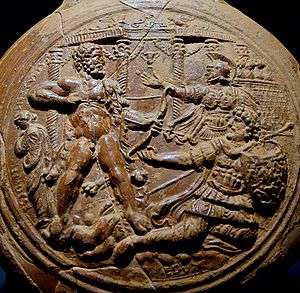Laomedon
In Greek mythology, Laomedon (/leɪˈɒmɪdɒn/; Ancient Greek: Λαομέδων) was a Trojan king, son of Ilus and thus nephew of Ganymede and Assaracus.

Family
Laomedon was the father of Priam, Astyoche, Lampus, Hicetaon, Clytius, Cilla, Proclia, Aethilla, Medesicaste, Clytodora, and Hesione.[1] Tithonus is also described by most sources as Laomedon's eldest legitimate son, and most sources omit Ganymede from the list of Laomedon's children, but indicate him as his uncle instead. Laomedon's possible wives are Placia, Strymo (or Rhoeo), and Leucippe;[1] by the former he begot Tithonus and by the latter King Priam (see John Tzetzes' Scholia in Lycophronem 18 «ὁ μὲν γὰρ Πρίαμος ἦν Λευκίππης, ὁ δὲ Τιθωνὸς Ῥοιοῦς ἢ Στρυμοῦς τῆς Σκαμάνδρου θυγατρὸς υἱός»: "Priamus was the son of Leucippe, whereas Tithonus was the son of Rhoeo or Strymo, the daughter of Scamander"). He also had a son named Bucolion by the nymph Calybe, as recounted by Homer in the Iliad (6.22). Dictys Cretensis (4.22) added Thymoetes to the list of Laomedon's children.
Mythology
Magical horses
Laomedon owned several horses with divine parentage that Zeus had given Tros (Laomedon's grandfather) as compensation for the kidnapping of Ganymede.[2] Anchises secretly bred his own mares from these horses.
According to one story, Tros's son, Ganymede, was kidnapped by Zeus, who had fallen in love with the beautiful boy. Tros grieved for his son. Sympathetic, Zeus sent Hermes with two horses so swift they could run over water. Hermes also assured Tros that Ganymede was immortal and would be the cupbearer for the gods, a position of much distinction.Tros, was an earlier King of Troy and grandfather of Laomedon (making him an uncle to Laomedon). Laomedon himself was the son of Ganymede's brother Ilus, the son of Tros.
Wrath of gods
When Poseidon and Apollo entered a conspiracy to put Zeus in bonds, the supreme god being offended, sent them to serve with King Laomedon as punishment for their nefarious design.[3][4] In other sources, the two gods simply tested the wantonness of the Laomedon.[5] As ordered by Laomedon who promised wages, the two deities assuming the likeness of men undertook to build huge walls around the city. But when they had finished, the king refused to fulfil their agreement of reward. In vengeance, before the Trojan War, Apollo sent a pestilence to Troy while Poseidon released a sea monster which, carried up by a flood, snatched away the people of the plain.
The oracles foretold deliverance from these calamities if Laomedon would expose his daughter Hesione to be devoured by the sea monster. The king then exposed her by fastening her to the rocks near the sea. But by chance, after fighting the Amazons, Heracles, who had landed at Troy, saw the girl to be sacrificed. The hero promised to save the princess on condition of receiving from Laomedon the mares which Zeus had given in compensation for the rape of Ganymede. When Laomedon agreed, Heracles (along with Oicles and Telamon) killed the monster and rescued Hesione at the last minute. But when Laomedon would not give up his magical horses for their deeds, the hero put to sea after threatening to make war on Troy.
Siege of Heracles
After his servitude, Heracles mustered an army of noble volunteers and sailed for Ilium with eighteen ships of fifty oars each. Having come to port at Ilium, he left the guard of the ships to Oicles and he, with the rest of the champions, set out to attack the city. Meanwhile, Laomedon marched against the ships with a multitude and slew Oicles in battle. But being repulsed by the troops of Heracles, Laomedon was besieged. The siege once laid, Telamon was the first to breach the wall and enter the city, and after him Heracles. When the son of Zeus had taken the city he shot down Laomedon and his sons, except Podarces. Heracles assigned Hesione as a war prize to Telamon (by whom he had a son called Teucer by her[6]) and allowed her to take with her whomsoever of the captives she would. When Hesione chose Podarces, Heracles said that her brother must first be a slave and then be ransomed by her. So, when the prince was being sold, Hesione took the golden veil from her head and gave it as a ransom; hence Podarces was thereafter called Priam (from priamai 'to buy').
Genealogical tree
References
| Wikimedia Commons has media related to Laomedon. |
- Apollodorus and Hyginus p. 63
- Apollodorus and Hyginus p. 34
- Scholiast on Homer. Iliad, xxi.444 and Tzetzes. Scholiast on Lycophron 34 (as noted in Pseudo-Apollodorus. Bibliotheca, 2.5.9, Note 2)
- The conspirator-gods: Poseidon, Hera, and Athena but Apollo was not mentioned in Homer's Iliad, 1.399ff.
- Pseudo-Apollodorus. Bibliotheca, 2.5.9
- Apollodorus and Hyginus pp. 38–39
Bibliography
- Apollodorus and Hyginus (2007) Apollodorus' Library and Hyginus' Fabulae: Two Handbooks of Greek Mythology. Trans. R. Scott Smith and Stephen Trzaskoma. Indianapolis: Hackett Pub. ISBN 1603843272.
| Legendary titles | ||
|---|---|---|
| Preceded by Ilus |
King of Troy | Succeeded by Priam |